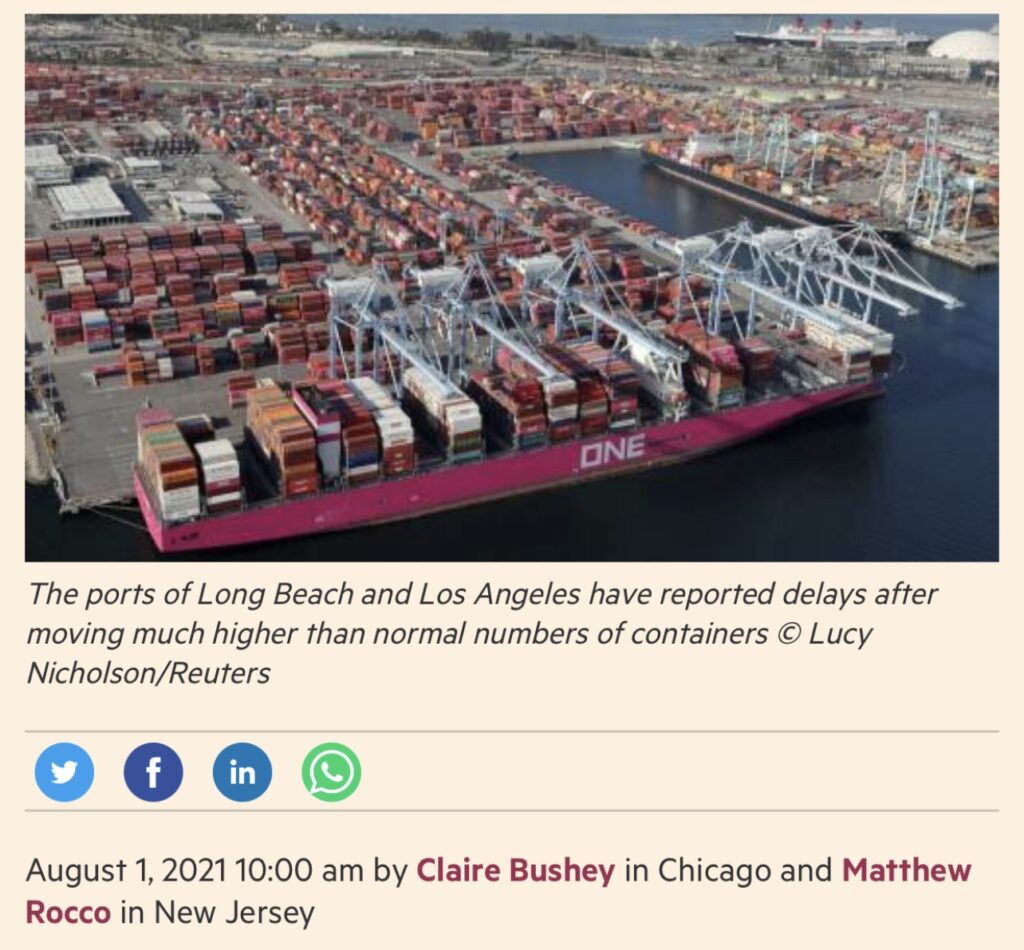The global supply chain wasn’t built for this’: freight delays hammer US
Ports, rail yards and warehouses are straining to meet roaring consumer demand as economy recovers.
Wayne Kaylor knew his shipping container was parked somewhere in a Chicago rail yard. He just did not know where, and for 78 days, no one could tell him.

Thanks to roaring consumer demand, US rail yards, ports and warehouses are choked with freight, with too few people to move it quickly, causing delays and rising prices for companies and consumers. Kaylor heads Way Interglobal, an Elkhart, Indiana distributor selling refrigerators, stoves and other appliances to big-name RV manufacturers like Winnebago Industries. From May 4 to July 21, Kaylor’s shipping container holding dozens of electric fireplaces got lost in the shuffle.

“It’s crazy,” he said, noting the delay cost the company sales. “Even though everything is GPS-tagged, they lost it in the rail yard.”
California ports in Long Beach, Los Angeles and Oakland reported delays earlier this year, and this month the Union Pacific and BNSF railroads made it clear that the problem had reached inland. UP halted freight shipments and BNSF began metering them as the railroads moved to purge their metro Chicago rail yards of containers that, like Kaylor’s, had been rendered inaccessible.
Manufacturers are tacking on surcharges and bemoaning lost business, with industrial conglomerate Honeywell International blaming supply chain difficulties for a revenue hit of up to $200m. Retailers are scrambling to secure enough products to sell for the holiday season, with big chains ordering larger amounts of inventory than normal, hoping at least some of it arrives on time.
“The global supply chain was not built for this,” said Brian Bourke, chief growth officer at Seko Logistics in suburban Chicago. “They were built for seasonal surges of demand annually. When you have 12 peak seasons in every mode, things begin to break down.”
”I don’t think there’s a port in the country that hasn’t been touched by congestion.”
Todd Tranausky, a transportation analyst with FTR Intelligence
CH Robinson, a Minnesota-based logistics company, said the over-ordering has exacerbated shipping disruptions. Goods coming from China are delayed by 15 to 20 days after their arrival at US ports, and up to a quarter of intermodal shipping containers are unavailable because some are being used as temporary storage, according to the company.
Ports on both US coasts are straining. Long Beach moved more than 907,000 containers in May, the highest number since 1995. Nine out of the port’s 10 busiest months in the past quarter century have all come in the past 12 months. Across the country, the port at Savannah, Georgia moved 5.3m containers for the 12 months ending June 30, a record for the port and 20 per cent more than the previous fiscal year.
“I don’t think there’s a port in the country that hasn’t been touched by congestion,” said Todd Tranausky, a transportation analyst with FTR.
At the railroads, aggressive furloughing has left companies without the necessary staff to handle the surge in demand, Tranausky said. Rates have risen commensurately, with shipping prices up to 15 per cent higher than they were a year ago. Though he forecasted the increase will slow in the second half of the year and in 2022, “it’s not going to be, by any stretch of the imagination, a shipper’s market”.
Shoppers already are feeling the hit. With costs on the rise, companies that make everything from tissues to salad dressing have been raising prices to help make up the difference. US consumer prices in June jumped 5.4 per cent from a year ago, a fresh 13-year high after rising 5 per cent in May, according to the US Bureau of Labor Statistics.
Procter & Gamble, the company behind Tide detergent and Gillette razors, plans to raise prices on some of its products after warning of a $1.9bn after-tax hit in the year ahead from higher commodity and freight costs.
Colgate-Palmolive is also charging more. “Logistic networks are taxed, whether it’s the trucking and warehousing here in the US or ocean freight coming from Asia to the rest of the world,” chief executive Noel Wallace said on Friday.
Source: FT
You must be logged in to post a comment.